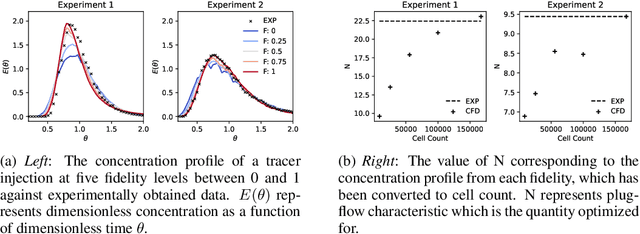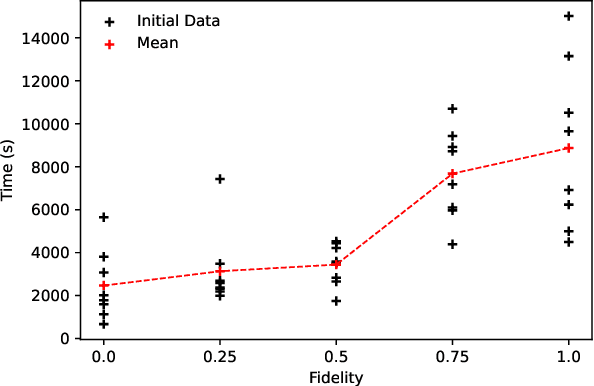Nausheen Basha
Machine Learning-Assisted Discovery of Novel Reactor Designs via CFD-Coupled Multi-fidelity Bayesian Optimisation
Aug 17, 2023Abstract:Additive manufacturing has enabled the production of more advanced reactor geometries, resulting in the potential for significantly larger and more complex design spaces. Identifying and optimising promising configurations within broader design spaces presents a significant challenge for existing human-centric design approaches. As such, existing parameterisations of coiled-tube reactor geometries are low-dimensional with expensive optimisation limiting more complex solutions. Given algorithmic improvements and the onset of additive manufacturing, we propose two novel coiled-tube parameterisations enabling the variation of cross-section and coil path, resulting in a series of high dimensional, complex optimisation problems. To ensure tractable, non-local optimisation where gradients are not available, we apply multi-fidelity Bayesian optimisation. Our approach characterises multiple continuous fidelities and is coupled with parameterised meshing and simulation, enabling lower quality, but faster simulations to be exploited throughout optimisation. Through maximising the plug-flow performance, we identify key characteristics of optimal reactor designs, and extrapolate these to produce two novel geometries that we 3D print and experimentally validate. By demonstrating the design, optimisation, and manufacture of highly parameterised reactors, we seek to establish a framework for the next-generation of reactors, demonstrating that intelligent design coupled with new manufacturing processes can significantly improve the performance and sustainability of future chemical processes.
Deep Gaussian Process-based Multi-fidelity Bayesian Optimization for Simulated Chemical Reactors
Oct 31, 2022



Abstract:New manufacturing techniques such as 3D printing have recently enabled the creation of previously infeasible chemical reactor designs. Optimizing the geometry of the next generation of chemical reactors is important to understand the underlying physics and to ensure reactor feasibility in the real world. This optimization problem is computationally expensive, nonlinear, and derivative-free making it challenging to solve. In this work, we apply deep Gaussian processes (DGPs) to model multi-fidelity coiled-tube reactor simulations in a Bayesian optimization setting. By applying a multi-fidelity Bayesian optimization method, the search space of reactor geometries is explored through an amalgam of different fidelity simulations which are chosen based on prediction uncertainty and simulation cost, maximizing the use of computational budget. The use of DGPs provides an end-to-end model for five discrete mesh fidelities, enabling less computational effort to gain good solutions during optimization. The accuracy of simulations for these five fidelities is determined against experimental data obtained from a 3D printed reactor configuration, providing insights into appropriate hyper-parameters. We hope this work provides interesting insight into the practical use of DGP-based multi-fidelity Bayesian optimization for engineering discovery.
 Add to Chrome
Add to Chrome Add to Firefox
Add to Firefox Add to Edge
Add to Edge